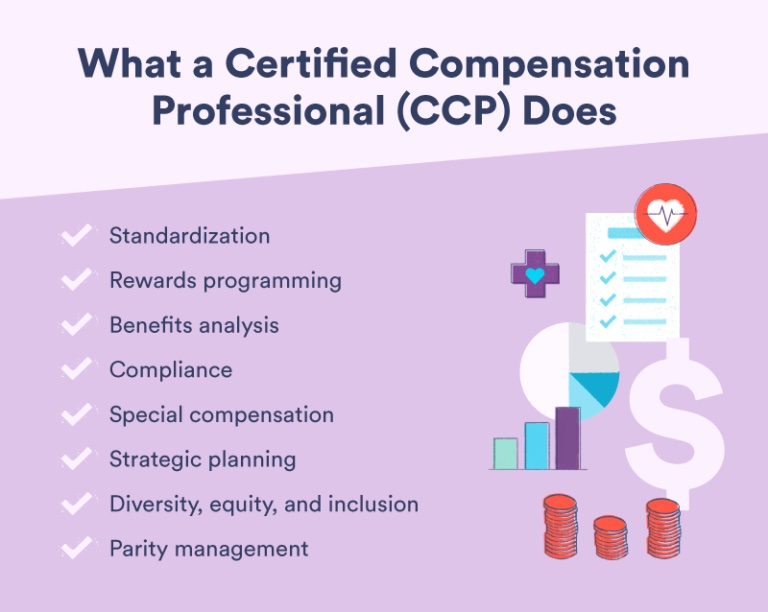
Table of contents
- 1.What is a Certified Compensation Professional?
- 2.What does a CCP do?
- 3.Standardization
- 4.Rewards programming
- 5.Employee benefits analysis
- 6.Compliance
- 7.Special compensation
- 8.Strategic planning
- 9.Diversity, equity and inclusion
- 10.Parity management
- 11.How can businesses get the same results without hiring a full-time CCP?
Note: This story was last updated January 31, 2023 One of the most expensive assets any company can acquire is its human capital. Employees can make or break a company. They may drive it to innovation, adaptation, and success or run it into the ground. Compensation costs account for a significant portion of many companies’ budgets; for service providers, nearly 100%. Ensuring that staff is fairly compensated per their skills, experience, and the market conditions, and that this drives your strategic plan forward, is critical to business success. For many organizations, total compensation is an afterthought. They calculate wages based on need versus available talent. Benefits, perks, and other rewards evolve over time, perhaps arbitrarily. Relatively few companies, especially small to midsize businesses, have a specific, detailed compensation plan. Yet not making compensation a top priority is too costly a practice. The Work Institute's 2020 Retention Report (1) found that employees quitting because of inadequate benefits is on the rise. So if your goal is to attract and retain valued employees, it may be worth getting help. A Certified Compensation Professional can assist in developing a strategic plan that aligns wages and benefits with business strategy. Moreover, they're thinking both short- and long-term, helping businesses plan for today and into the future. Certified compensation specialists perform a valuable HR function. They tend to vital tasks involving different aspects of compensation management. A Certified Compensation Professional designation means the person is qualified to handle the following impactful duties and more.
Certified compensation specialists perform a valuable HR function. They tend to vital tasks involving different aspects of compensation management. A Certified Compensation Professional designation means the person is qualified to handle the following impactful duties and more.
What is a Certified Compensation Professional?
Certified Compensation Professionals have completed education on different facets of compensation programs. Achieving a CCP certification includes coursework to gain essential knowledge covering:- Job analysis.
- Documentation and evaluation.
- Market analysis.
- Statistics.
- Accounting and finance.
- Variable pay strategies.
What does a CCP do?
 Certified compensation specialists perform a valuable HR function. They tend to vital tasks involving different aspects of compensation management. A Certified Compensation Professional designation means the person is qualified to handle the following impactful duties and more.
Certified compensation specialists perform a valuable HR function. They tend to vital tasks involving different aspects of compensation management. A Certified Compensation Professional designation means the person is qualified to handle the following impactful duties and more.Standardization
If you bring on a CCP to your business, they may initially spend a lot of time on compensation benchmarking. They’ll examine job descriptions, ensuring they’re current and accurately reflect the work being performed. With these, they analyze whether the compensation program aligns with job market conditions and demand in your region. A CCP will continuously monitor existing job descriptions by assessing the skills required. They may develop:- Overall job categories or a structured, tiered program.
- Salary ranges and pay programs for new hires.
- Advancement, variable pay programs, and other career and financial timelines and incentives for existing staff members.
Rewards programming
Strategizing how to tie pay to performance is another area of expertise. CCPs look at a range of reward programs and criteria, from the base pay administration and annual reviews to bonuses, commissions, and other employee incentives. The compensation specialist will often oversee performance evaluations, even informal ones. This strategy helps ensure employees are appropriately rewarded for career milestones and achievements. Being able to integrate compensation programs may be another item on a CCP's to-do list. They make overarching recommendations of best practices and can develop specific rewards programming for the organization.Employee benefits analysis
Total compensation is another area for quantitative analysis. Comprehensive compensation analysis sheds light on the balance between demonstrating appreciation for employees and honoring the company's compensation goals and budget. It involves a deep dive into both internal data and external market data pertaining to:- Traditional benefits, like healthcare coverage and paid time off.
- Perks, or fringe benefits, like volunteer time off.
- Bonuses and other performance-based incentive programming.
- All other types of compensation offered or considered.
- Effectiveness of where/how the budget is currently being spent versus how it could be more effectively spent.
Compliance
CCPs also manage regulatory compliance. These professionals are trained in compensation law at the federal and local levels. They affirm that policies align with the Fair Labor Standards Act, comply with any local legislation, and avoid discrimination in what should be fair compensation.Special compensation
For sales professionals, compensation tied to rewards and goals requires a more nuanced approach. This responsibility can include creating formulas, determining and assigning territories or quotas, sales modeling, and more. The goal is to provide equitable earning opportunities and create an employee incentive compensation program that drives excellence. For executives, aligning compensation with the strategic goals of the organization includes more than golden parachutes. The CCP must have a broad knowledge of:- Market conditions and trends.
- Regulatory and tax compliance.
Strategic planning
A Certified Compensation Professional works with management to align programs with the business’s short- and long-term strategic plan. As the organization plans for growth, the CCP provides data to forecast needs and costs. Leveraging available resources — including modeling software, in-house and external databases, and other tools — helps anticipate cost projections, where talent will be plentiful, and how to overcome shortages if necessary.Diversity, equity and inclusion
The CCP will work closely with any DEI initiatives the organization might have. They analyze wages, benefits, and employee categories to help businesses achieve fair compensation. As companies develop equity, the CCP can help them benchmark, plan, and fulfill their goals.Parity management
Behind the scenes, these professionals are keeping job descriptions, employee categories, and performance evaluations current, relevant, and timely. They drive company culture with programs that are transparent and maintain parity for similar jobs and role categories within the organization.How can businesses get the same results without hiring a full-time CCP?
Companies with 1,000 or more employees are typically the ones that hire CCPs. However, smaller organizations can achieve similar results by hiring a compensation management consultant or upskilling a current employee. That employee could be the person already fulfilling the role of compensation and benefits manager. When choosing a current team member to perform as this type of compensation management specialist, organizations should look for:- Business skills. The person should have a strong business acumen.
- Analytical skills. Analyzing and drawing conclusions from data is a key activity the person will need to master.
- Communication skills. Sharing ideas and recommendations and implementing programs and solutions means getting the points across to every employee and leader. Effective communication skills are a must-have.
- Organizational skills. Handling company compensation requires keeping tabs on many moving parts. An unorganized person will get buried and overwhelmed quickly.
This article is for informational purposes only, is not legal, tax or accounting advice, and is not an offer to sell, buy or procure insurance. It may contain links to third-party sites or information for reference only. Inclusion does not imply TriNet’s endorsement of or responsibility for third-party content.

TriNet Team
Best practices from our HR experts
Table of contents
- 1.What is a Certified Compensation Professional?
- 2.What does a CCP do?
- 3.Standardization
- 4.Rewards programming
- 5.Employee benefits analysis
- 6.Compliance
- 7.Special compensation
- 8.Strategic planning
- 9.Diversity, equity and inclusion
- 10.Parity management
- 11.How can businesses get the same results without hiring a full-time CCP?


